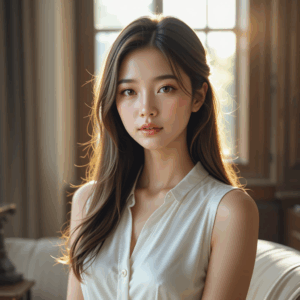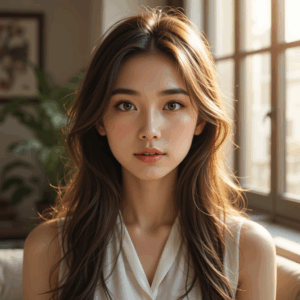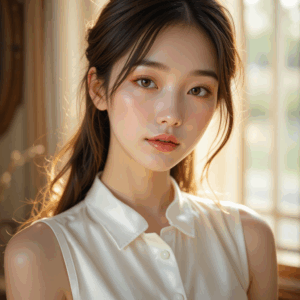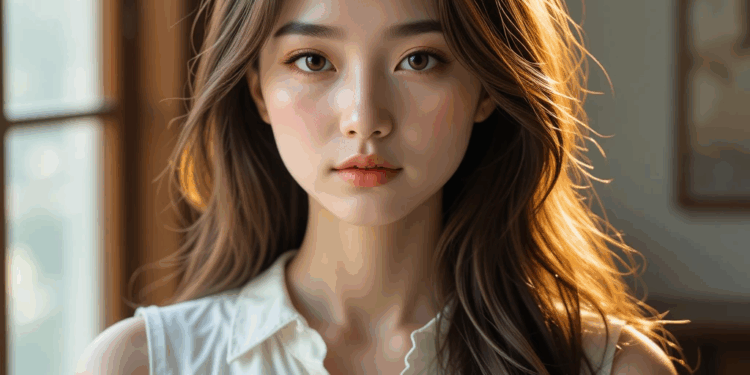Exploring the emergence of AI-generated women in the beauty industry, this piece delves into the fascinating realm where technology and aesthetics intersect. From redefining beauty standards to shaping societal perceptions, the impact of AI in this field is profound and ever-evolving.
 AI technology has significantly impacted the evolution of beauty standards by redefining traditional norms and influencing societal perceptions of beauty. With the ability to analyze vast amounts of data and detect patterns, AI has brought about a shift in what is considered beautiful in today's society.
.
AI technology has significantly impacted the evolution of beauty standards by redefining traditional norms and influencing societal perceptions of beauty. With the ability to analyze vast amounts of data and detect patterns, AI has brought about a shift in what is considered beautiful in today's society.
.
 AI-generated women have revolutionized the marketing and advertising industry, offering new opportunities for brands to connect with consumers in innovative ways. Let's delve into how AI-generated women are reshaping the landscape of marketing campaigns and advertising beauty products.
AI-generated women have revolutionized the marketing and advertising industry, offering new opportunities for brands to connect with consumers in innovative ways. Let's delve into how AI-generated women are reshaping the landscape of marketing campaigns and advertising beauty products.
 In conclusion, Beauty by Code: The Rise of AI-Generated Women sheds light on the intricate relationship between artificial intelligence and beauty, paving the way for a future where innovation and creativity intertwine seamlessly.
In conclusion, Beauty by Code: The Rise of AI-Generated Women sheds light on the intricate relationship between artificial intelligence and beauty, paving the way for a future where innovation and creativity intertwine seamlessly.
Introduction to AI-Generated Women in Beauty
AI-generated women in beauty refer to digitally created female images that are generated using artificial intelligence technology. These AI-generated women can be used in various aspects of the beauty industry, from creating virtual models for cosmetics and skincare products to setting new beauty standards based on algorithmically determined features.Using AI to Create Beauty Standards
AI algorithms analyze vast amounts of data to identify patterns and trends in beauty preferences. By using this data, AI can create virtual women with idealized features that appeal to a wide audience. These AI-generated beauty standards can influence marketing strategies, product development, and even societal perceptions of beauty.Impact of AI-Generated Women on the Beauty Industry
- Personalized Beauty Recommendations: AI can analyze individual preferences and characteristics to provide personalized beauty recommendations, leading to enhanced customer experiences.
- Efficient Product Development: By using AI-generated women for product testing and virtual try-ons, companies can streamline the product development process and reduce costs.
- Social Media Influence: AI-generated women are increasingly used in social media campaigns, influencing trends and shaping beauty ideals among online audiences.
- Ethical Concerns: The use of AI-generated women can raise ethical concerns regarding unrealistic beauty standards and the potential impact on body image and self-esteem.
Evolution of Beauty Standards through AI
 AI technology has significantly impacted the evolution of beauty standards by redefining traditional norms and influencing societal perceptions of beauty. With the ability to analyze vast amounts of data and detect patterns, AI has brought about a shift in what is considered beautiful in today's society.
AI technology has significantly impacted the evolution of beauty standards by redefining traditional norms and influencing societal perceptions of beauty. With the ability to analyze vast amounts of data and detect patterns, AI has brought about a shift in what is considered beautiful in today's society.
Facial Symmetry and Proportions
AI algorithms have been employed to analyze facial symmetry and proportions, which are often associated with traditional beauty standards. By identifying these ideal measurements, AI has influenced cosmetic procedures and beauty trends to align with these standards.Diversity and Inclusivity
AI has played a crucial role in promoting diversity and inclusivity in the beauty industry. Through the use of AI-generated models and influencers representing a wide range of ethnicities, body types, and gender identities, beauty standards have become more inclusive and reflective of society's diverse population.Personalized Beauty Recommendations
AI-powered beauty platforms can analyze individual preferences, skin types, and features to provide personalized beauty recommendations. This personalized approach to beauty has challenged one-size-fits-all beauty standards and emphasized the uniqueness of each individual's beauty.Virtual Try-Ons and Augmented Reality
AI technology has enabled virtual try-on experiences and augmented reality tools that allow consumers to experiment with different makeup looks and hairstyles virtually. This has not only revolutionized the beauty shopping experience but has also allowed individuals to explore and redefine their own beauty standards.Embracing Imperfections
AI has also played a role in shifting beauty standards by emphasizing the beauty of imperfections. Through the use of AI-generated imagery showcasing natural skin textures, body shapes, and features, there has been a growing acceptance and celebration of individual uniqueness and authenticity in beautyEthical Considerations in AI-Generated Women
As AI technology continues to advance, it brings along a myriad of ethical considerations, especially in the realm of beauty where AI-generated women are becoming more prevalent.Potential Biases in AI Algorithms Related to Beauty Standards
AI algorithms used in generating women's beauty can be susceptible to biases based on the data they are trained on. These biases can perpetuate narrow beauty standards, leading to exclusion and discrimination against certain groups.Implications of AI-Generated Women on Diversity and Representation
- AI-generated women may not accurately represent the diversity of real women, potentially reinforcing stereotypes and limiting the visibility of underrepresented groups.
- There is a risk of further marginalizing certain communities if AI-generated women continue to uphold mainstream beauty ideals without embracing the full spectrum of beauty diversity.
- It is essential to ensure that AI algorithms are developed and trained with diverse and inclusive data sets to promote equitable representation in AI-generated women and challenge existing beauty norms.
Impact of AI-Generated Women on Marketing and Advertising
 AI-generated women have revolutionized the marketing and advertising industry, offering new opportunities for brands to connect with consumers in innovative ways. Let's delve into how AI-generated women are reshaping the landscape of marketing campaigns and advertising beauty products.
AI-generated women have revolutionized the marketing and advertising industry, offering new opportunities for brands to connect with consumers in innovative ways. Let's delve into how AI-generated women are reshaping the landscape of marketing campaigns and advertising beauty products.
Utilization of AI-Generated Women in Marketing Campaigns
AI-generated women are being utilized in marketing campaigns to create visually appealing content that resonates with target audiences. Brands can tailor these virtual models to embody their ideal consumer demographics, allowing for more personalized and relatable advertising strategies.Effectiveness of AI-Generated Women in Advertising Beauty Products
The use of AI-generated women in advertising beauty products has proven to be highly effective in capturing consumer attention and driving engagement. These virtual models can showcase a wide range of beauty products in diverse settings, helping consumers envision themselves using the products and achieving desired results.Consumer Reactions to AI-Generated Women in Beauty Advertisements
Consumer reactions to AI-generated women in beauty advertisements have been mixed. While some appreciate the creativity and innovation behind using virtual models, others express concerns about unrealistic beauty standards perpetuated by these AI-generated women. Brands must navigate these reactions carefully to ensure their advertising campaigns resonate positively with consumers.Closure
 In conclusion, Beauty by Code: The Rise of AI-Generated Women sheds light on the intricate relationship between artificial intelligence and beauty, paving the way for a future where innovation and creativity intertwine seamlessly.
In conclusion, Beauty by Code: The Rise of AI-Generated Women sheds light on the intricate relationship between artificial intelligence and beauty, paving the way for a future where innovation and creativity intertwine seamlessly.










